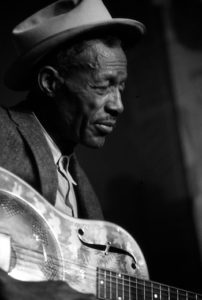
Son House
*On this date in 1902, Son House was born. He was a Black blues musician.
Born in Riverton, Mississippi, on a Delta plantation, House took up with the church early on and became a Baptist pastor by the time he turned twenty. But he straddled the sacred and secular worlds, which led to troubles with women and alcohol. He also discovered the power of the blues. After spending time in Louisiana in the early 1920s, House returned to the Delta in 1926 and learned how to play guitar.
He worked local juke joints and house parties until 1928 when he allegedly shot and killed a man in self-defense. House was sent to Parchman Farm, an infamous Mississippi penitentiary. A judge reexamined his case and ordered him released from prison. House left Clarksdale for Lula, Mississippi, where he met Charley Patton and Willie Brown. He performed and traveled with them to Grafton, Wisconsin, where, in 1930, all three blues guitarists recorded sides for the Paramount label. One of the songs House recorded, Preachin’ The Blues, was a powerful, personalized account of how the blues stole his soul from the Baptist church. House performed on occasion with Patton and Brown until Patton died in 1934. House worked jukes and dances with Brown as a solo artist for the remainder of his time in Mississippi.
In 1941, Alan Lomax recorded Son House for the Library of Congress. Lomax returned to Mississippi in 1942 and recorded House a second time. House moved to Rochester, New York, the following year and disappeared from the blues scene until 1964. Hailed as the greatest surviving original Delta bluesman, House became a hero to the young, white, folk-blues crowd of the early ‘60s. He performed at the 1964 Newport Folk Festival; a year later, House played at Carnegie Hall and signed a recording contract with CBS Records. His album Father of the Folk Blues (later renamed Death Letter) was a critical success and led to appearances at many of the major folk and blues festivals in the U.S. and Europe. In 1969, he was the subject of a blues documentary called Son House. A central blues figure, Son House, was one of the originators of the Mississippi Delta blues style.
Like Patton and Brown, House defined early Delta blues in the late 1920s and 1930s with his irregular, furious guitar work and intensely emotional vocals. House’s blues style was so profound that he was the main influence of bluesmen Robert Johnson and Muddy Waters. House sang and played his guitar with compelling urgency and conviction. His brand of the blues was streaked with preacher passion and raw, manly desires, which seemed to turn many songs into battles between good and evil, sin and redemption. By 1971, House fell into ill health. Although he performed at the occasional festival in the early 1970s, his blues career ended. In 1976, he moved to Detroit.
He was inducted into the Blues Foundation’s Hall of Fame in 1980. Son House died on October 19, 1988
Nothing But the Blues The Music and the Musicians
Edited by Lawrence Cohn
Copyright 1993 Abbeville Publishing Group, New York
ISBN 1-55859-271-7